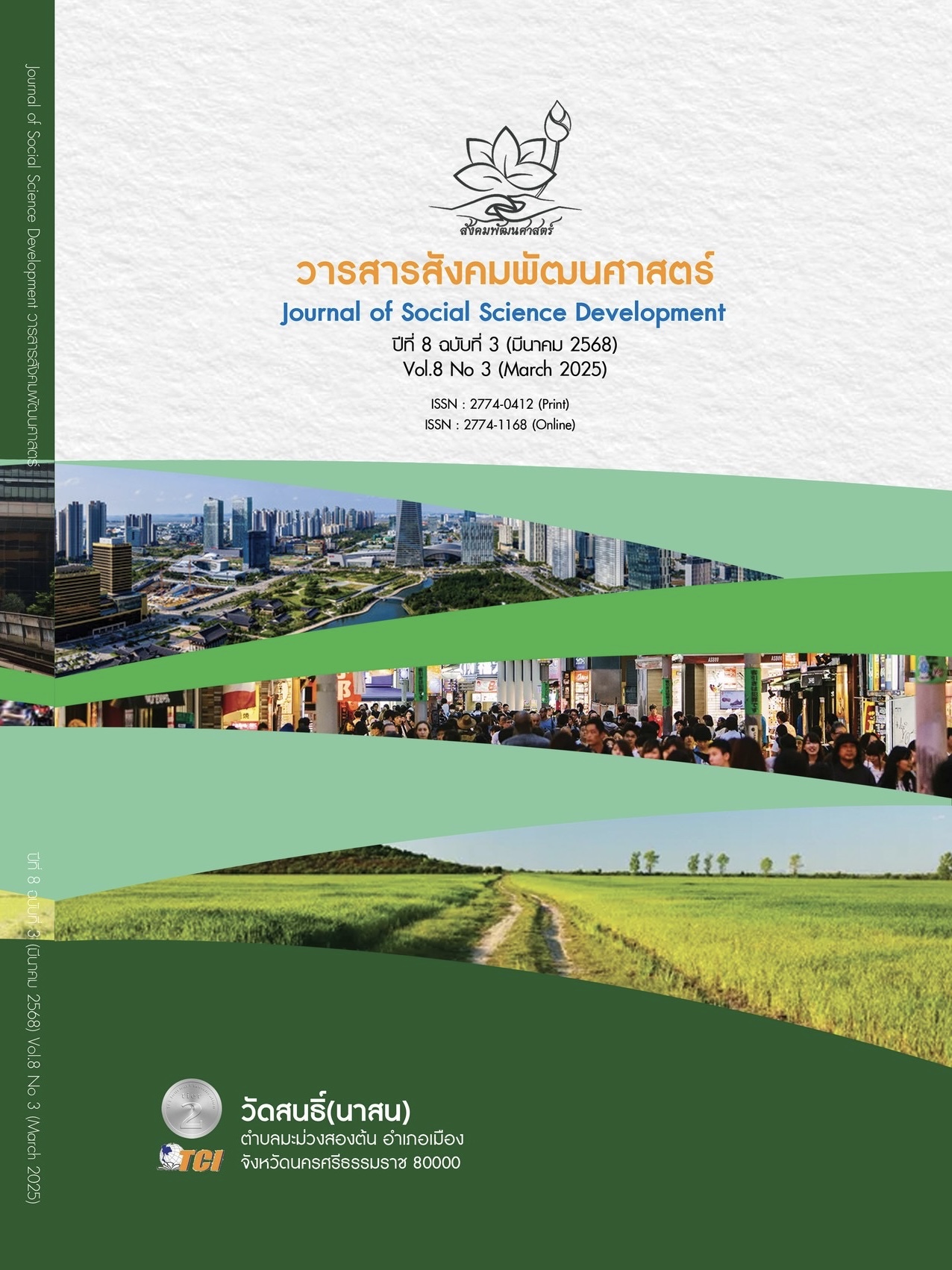แนวทางการสื่อสารในการรณรงค์หาเสียงเลือกตั้ง นายกองค์การบริหารส่วนจังหวัด ปี 2568
Main Article Content
บทคัดย่อ
การวิจัยนี้มีวัตถุประสงค์เพื่อศึกษา 1) แนวทางการออกแบบเนื้อหาในการรณรงค์หาเสียงเลือกตั้งนายกองค์การบริหารส่วนจังหวัด 2) แนวทางการใช้สื่อในการรณรงค์หาเสียงเลือกตั้งนายกองค์การบริหารส่วนจังหวัด โดยใช้การวิจัยเชิงคุณภาพด้วยวิธีการสัมภาษณ์เชิงลึก เก็บรวบรวมข้อมูลจากผู้ให้ข้อมูลหลักที่นักวางแผนหาเสียงการเลือกตั้ง จำนวน 15 คน ด้วยแบบสัมภาษณ์เชิงลึกแบบมีโครงสร้าง วิเคราะห์ข้อมูลด้วยการสร้างข้อสรุป ผลการศึกษา พบว่า การออกแบบเนื้อหาเพื่อการสื่อสารคุณลักษณะของผู้สมัครเป็นปัจจัยสำคัญในการสร้างภาพลักษณ์และความเชื่อมั่นจากประชาชน โดยเน้นคุณธรรม ความซื่อสัตย์ วิสัยทัศน์ และแผนพัฒนาเพื่อแสดงทิศทางในอนาคตของท้องถิ่น การมีผลงานที่ชัดเจน การเข้าถึงประชาชนอย่างใกล้ชิด การนำเสนอนโยบายที่ครอบคลุมทุกกลุ่มเป็นการแสดงถึงความเท่าเทียม โดยทักษะการเป็นผู้นำที่ดีเสริมสร้างความมั่นใจในความสามารถในการบริหารท้องถิ่น ส่วนนโยบายการพัฒนาต้องออกแบบเนื้อหาที่ชัดเจนช่วยให้ประชาชนเข้าใจและสนับสนุนมากขึ้น โดยเน้นการพัฒนาโครงสร้างพื้นฐาน การส่งเสริมเศรษฐกิจท้องถิ่น การพัฒนาการศึกษา สุขภาพ สิ่งแวดล้อม คุณภาพชีวิต การมีส่วนร่วมของประชาชนในการพัฒนาจังหวัดช่วยเพิ่มความโปร่งใส การใช้เทคโนโลยีในการพัฒนาบริการภาครัฐเพิ่มความสะดวกในการเข้าถึงประชาชน การบริหารจัดการที่โปร่งใสช่วยสร้างความไว้วางใจ สำหรับการใช้สื่อดั้งเดิมยังมีบทบาทสำคัญ เช่น ป้ายหาเสียง การแจกแผ่นพับ การใช้รถแห่ และการปราศรัยในพื้นที่ การเคาะประตูพบปะประชาชนและทีมหัวคะแนนจะช่วยกระจายข้อมูลอย่างมีประสิทธิภาพ ส่วนการใช้สื่อใหม่ ประกอบด้วยเว็บไซต์ Facebook LINE YouTube TikTok และ X (Twitter) ช่วยเพิ่มการรับรู้และสร้างความเชื่อมั่นในตัวผู้สมัครได้รวดเร็ว
Article Details

อนุญาตภายใต้เงื่อนไข Creative Commons Attribution-NonCommercial-NoDerivatives 4.0 International License.
เอกสารอ้างอิง
ธีร์ธวัช เจนวัชรรักษ์. (2566). การใช้สื่อเพื่อประชาสัมพันธ์ผู้สมัครรับเลือกตั้งที่ส่งผลต่อการตัดสินใจของผู้มีสิทธิ์ออกเสียง กรณีศึกษา: การเลือกตั้งผู้ว่าราชการกรุงเทพมหานคร พ.ศ. 2565. วารสาร อิเล็กทรอนิกส์การเรียนรู้ทางไกลเชิงนวัตกรรม, 13(1), 93-112.
วิสุทธิ์ ขันศิริ. (2562). กลยุทธ์การตลาดการเมืองของพรรคอนาคตใหม่ในการหาเสียงเลือกตั้ง 24 มีนาคม 2565. วารสาร คณะนิเทศศาสตร์ มหาวิทยาลัยธุรกิจบัณฑิตย์, 16(1), 184-221.
สุพรรณา ภัทรเมธาวรกุล และคณะ. (2565). กระบวนการสื่อสารในการหาเสียงเลือกตั้งของนักการเมืองท้องถิ่น. วารสารวารสาร มจร สังคมศาสตร์ปริทรรศน์, 11(6), 178-196.
__________. (2566). การสื่อสารเพื่อรณรงค์หาเสียงเลือกตั้งนายกองค์การบริหารส่วนจังหวัดสมุทรปราการของกลุ่มสมุทรปราการก้าวหน้า. วารสารสังคมศาสตร์และวัฒนธรรม, 7(6), 178-196.
สุเมธ ตั้งประเสริฐ. (2565). กลยุทธ์และวิธีการสื่อสารของพรรคการเมืองไทยผ่านสื่อสังคมออนไลน์ในการเลือกตั้งทั่วไป พ.ศ. 2562. วารสารรัฐศาสตร์ มหาวิทยาลัยราชภัฏสวนสุนันทา, 5(1), 25-38.
เอกสิทธิ์ อวยชัยวัฒน์. (2555). กลยุทธ์การโฆษณาหาเสียงเลือกตั้งของพรรคการเมืองไทย. วารสารนิเทศสยามปริทัศน์, 11(12), 107-121.
Abboud, E. et al. (2024). Social media and politics as usual? Exploring the role of socialmedia in the 2022 Kenyan presidential election. Journal of Eastern African Studies, 18(2), 321-343.
Haugsgjerd, A. & Karlsen, R. (2024). Election campaigns, news consumption gaps, and socialmedia: equalizing political news use when it matters? The International Journal of Press/Politics, 29(2), 507-529.
Hutchens, M. J. et al. (2021). Trust over use: Examining the roles of media use and media trust on misperceptions in the 2016 US presidential election. Mass Communication and Society, 24(5), 701-724.
Medvic, S. K. (2021). Campaigns and elections: players and processes. Oxfordshire: Routledge.
Qayumoghli, M. I. (2024). An Overview of The Role of Media and Social Networks on Politics. Integrated Journal for Research in Arts and Humanities, 4(1), 90-94.
Widayat, R. M. et al. (2022). 2019 Election Campaign Model in Indonesia Using Social Media. Webology, 19(1), 5216-5235.


